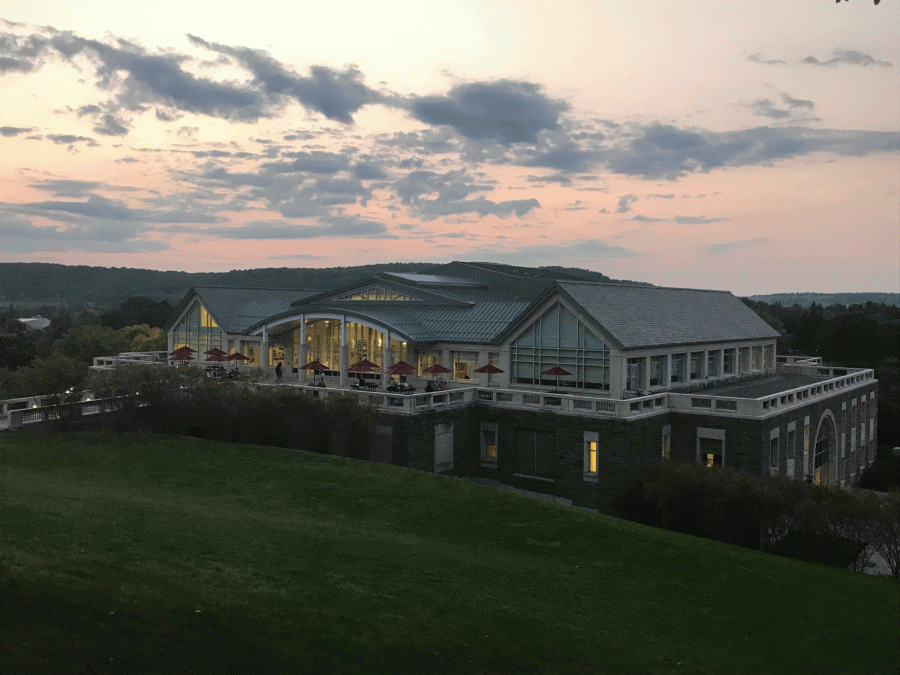Colgate Students Speak Out on DACA
Students gathered in the Batza Room of Case Library, pictured above, to speak out against DACA and share stories.
On September 14, a speakout was held for Colgate students to share how the Deferred Action for Childhood Arrivals (DACA) affected their lives and families. The Batza room in Case-Geyer Library was completely filled with students and faculty on both the tables and floor. The speakout served as a space to share pizza and personal experiences and each personal story was met with an abundance of support.
The speakout created a space for students to process the recent end to DACA, a program that provided protections for children of undocumented immigrants under the age of 31 who entered the United States undocumented while under the age of 16. The event was similar to a speakout held last year after Trump’s election.
“I think the event was truly eye opening. As a person who knows a lot of the people who spoke that night, I learned things about them that I may not been able to find out. Even those who I do not personally know, all of their messages moved me because it takes an immense amount of strength to speak up the way they did,” first-year David White said.
Brothers and the Latin American Student Organization (LASO) joined together to provide a platform for Colgate students to share their perspectives on DACA and support one another. Juniors Zachary Lee and Enrique Nuñez, senior Jonathan Burton and Assistant Professor of Educational Studies Anne Ríos-Rojas organized the event.
Lee felt that the stories shared throughout the event had a strong and lasting impact.
“The stories that people tell about their families living in fear of deportation and whatnot are really powerful. There is really nothing like the power of a personal experience and somebody being vulnerable in a space with you,” Lee said.
During the event, students had space to respond and contribute to the conversation on their own terms.
“The atmosphere was what we were going for in terms of people feeling comfortable to share their experiences and feel as though this was a space where they belong and they are valued. There were periods of silence, and everyone was in sort of a headspace where they were ready to learn and grow from what they were hearing from their peers. You can’t expect [a speakout] to have everyone constantly jumping in and out, so giving each person’s story time to sink in was part of the event that I ended up appreciating,” Lee said.
While Burton did feel that the speakout was a good way to unify students and set the precedent of collaboration between social justice groups early in the semester, he was disappointed by the low faculty and administration attendance. Organizers did their best to advertise the event via Facebook, word of mouth and direct contact with faculty, but ultimately, Burton feels the responsibility lies on faculty and the administration to stay in tune with the student body.
“People need this space, and the administration and the school itself doesn’t really make space for people in troubled times except for when the students have to take that initiative for themselves,” Burton said.
“The faculty and administration should have their eyes and ears on the ground and take an active approach in creating spaces and being a part of spaces. But I do want the professors that did come or did try to make it [to know we] really appreciate their presence,” Burton said.
Ríos-Rojas could not attend the event but still wanted to be actively involved in supporting affected students. She sent a letter to the event’s organizers expressing the importance of defending DACA, which organizer Nuñez read at the beginning of the event.
“We should be defending DACA not because these youth are ‘productive members of society,’ ‘have college degrees,’ or whatever other neoliberal metrics are being deployed to justify their inclusion. We should #defendDACA out of our collective sense of indignation for how its dismantling is an assault on human dignity and right to life, liberty, happiness,” Ríos-Rojas wrote.
In the back of the room, organizers spread out printed lists of the United States House of Representatives and provided a form for donations to Amnesty International, American Immigration Lawyers Association and the American Civil Liberties Union. In addition, the organizers provided information for contacting representatives to defend DACA.
Lee believes that students can take action beyond reaching out to representatives to tell them reasons why DACA should remain in place.
“Self care and validating one another is very important, but you cannot let this be where the buck stops. One thing that I was talking to Professor Anne Ríos-Rojas about in the education department, was seeing how we can take this flash point issue of DACA, and use it to build coalitions and forge more solidarity across campus. We are talking about something that is more about acknowledging one’s humanity than it is about any sort of paperwork or citizenship. So that is really the next step I think, so using this and seeing how issues of validation and humanizing one another can apply to other issues in other spaces around campus,” Lee said.
Contact Emily Rahhal at [email protected].
Emily Rahhal is a senior from Los Angeles, California double concentrating in Middle Eastern and Islamic Studies and Religion. She has previously worked...







